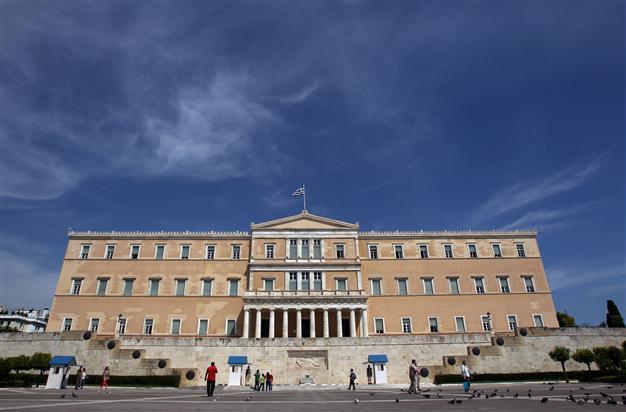Greek election uncertainty overshadows markets
LONDON - The Associated Press

The Greek Parliament is seen in Athens, Monday, May 7, 2012. AP photo
Elections in Greece renewed uncertainty over Europe's debt crisis, causing a massive drop on the Athens exchange, though losses elsewhere were trimmed as investors regained their poise and Spain announced it will help its banks.
Greece's election resulted in a massive loss of support for the two parties of the previous coalition government that had backed the austerity demanded by creditors in return for crucial bailout funds. Votes transferred mostly to extremist parties, making it difficult to form a new government that would support the rescue package meaning another election may be held in two months.
Antonis Samaras, leader of conservative New Democracy, which won the most votes, is currently trying to form a government, but amid the uncertainty, investors took fright.
Greek shares took a pounding, underperforming all others with a near 7 percent retreat on the main Athens exchange.
"Financial markets loath uncertainty, and so the reaction seen to the elections makes a great deal of sense," said David White, a trader at Spreadex.
Elsewhere in Europe, however, the early downbeat mood improved somewhat as investors awaited the arrival of Francois Hollande as French president following his defeat of Nicolas Sarkozy on Sunday.
Hollande campaigned on the need for more growth-generating economic policies and less reliance on austerity. While economists agree more growth would help fight the debt crisis, some fear Hollande could upset the balance in European policies, with uncertain consequences.
"The market will likely cautiously wait to gauge to what extent Hollande will want to renegotiate the French position about fiscal and economic matters in Europe," said Jan Dubsky, an analyst at Royal Bank of Scotland.
That reflective approach was evident in the performance of the CAC-40 in France, which following early losses, was trading 0.8 percent higher at 3,188.
Germany's DAX also trimmed losses to be trading only 0.2 percent lower at 6,548 after new figures showed the country's factory orders rose 2.2 percent in March, more than expected, despite an economic downturn in Europe.
Also helping markets recover from early losses was Spain's decision to present measures this week to support the banking sector a key source of worry over whether the country might need a financial bailout. Prime Minister Mariano Rajoy said he would not rule out lending, or injecting public money into the sector if necessary.
Madrid's main stock index rallied 1.8 percent on the news. Elsewhere, the FTSE 100 of leading British shares was closed for a public holiday.
In the U.S., the Dow Jones industrial average was down 0.3 percent at 13,004 while the broader S&P 500 index was unchanged at 1,369.
In the currency markets, the euro also recovered some of its poise after falling to a three-month low against the dollar during Asian trading hours. It was up 0.6 percent at $1.3047, having earlier fallen to $1.2972.
Earlier in Asia, Japan's Nikkei 225 index plunged 2.8 percent to close at 9,119.14 its lowest finish in three months with the market's export sector also sapped by a rising yen. Hong Kong's Hang Seng slid 2.6 percent to 20,536.59. In other Asia markets, Australia's S&P/ASX 200 lost 2.2 percent to 4,301.30 and South Korea's Kospi shed 1.6 percent to 1,956.44.
Oil prices fell alongside equities, with the benchmark New York rate down 76 cents at $97.73 a barrel.
